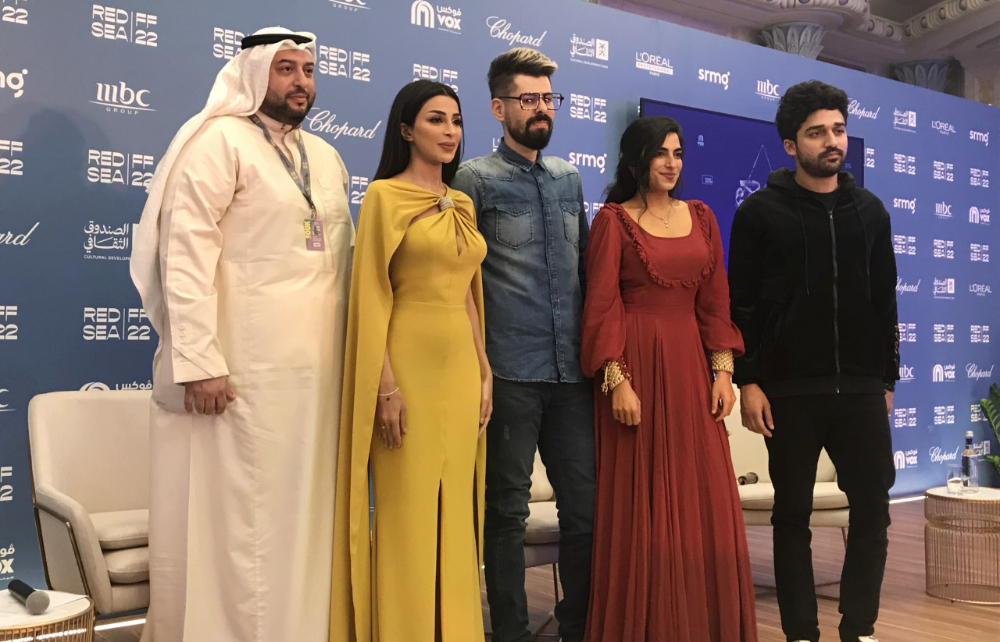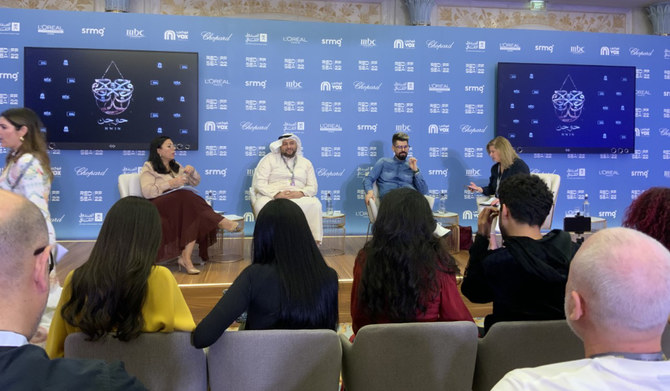JEDDAH: A panel discussion was held today in Jeddah during the second edition of the Red Sea International Film Festival, titled “Hawjan: From the Novel to the Screen,” to shed light on the journey of transforming the best-selling novel “HWJN” into a movie.
From written words to the screen, the speakers explained the success of the famous fantasy novel and the complexities of transforming it for the big screen.
The book, pronounced Hawjan, was the number one best-selling novel in the history of Saudi Arabia when released in 2013. It is the first book of a series of metaphysical and supernatural novels that depict the results of interacting with the unknown realm of the jinn, which co-exists with the human world.

Translator Yasser Bahjatt, Actress Al Anood Saud, Director Yasir Al-Yasiri, Actress Nour Khadra, Actor Baraa Alem. (AN photo)
Written by Ibraheem Abbas and translated into English by Yasser Bahjatt, the action-romance story details the interaction of two worlds and the unity of two different species to stop the evil of their worlds from slipping into each other.
It also sheds light on good jinns and shows the world from their perspective, with humans haunting their homes, and shows how some humans are more evil to each other than jinn are to them.
The idea of adapting the novel has been tickling the ambitious mind of the producer-turned-director Yasir Al-Yasiri after he was gifted the book in 2017 by his friend, Emirati filmmaker Majid Al-Ansari.
At first, Al-Yasiri did not take an interest in the book, until his friend insisted he reads it. “I read it overnight and I was actually like: Woah, this is something I want to work on,” said Al-Yasiri in a press release at The Ritz-Carlton Jeddah on Saturday.
He added that he decided to work on it because it “tackles a genre that is rarely addressed in the Arab world” and to “break the norm and bring something fresh.”
The two men immediately started working on the script and started the casting and filming process in 2018 with Al-Ansari as a director and Al-Yasiri as a producer. In 2020, the COVID-19 pandemic restricted Al-Ansari from coming to Saudi Arabia, leading Al-Yasiri to become the director, and he proceeded with filming.
The story introduces Sawsan, a medical student from the world of humans, and Hawjan, a curious man from the realm of the jinn, which humankind cannot see. The jinn man takes an interest in knowing Sawsan and her family after they move to a new house, where Hawjan and his family have been living for years.
While trying to maintain the boundaries between his life in both worlds, Hawjan discovers that he comes from a royal bloodline and tries to reclaim his right to the throne.
The script, written by both Al-Ansari and Al-Yasiri, ensures that the story has the necessary changes for the screen, but does not drift away from the book.
One of the biggest challenges the crew faced was creating a city that exists in the jinn world —Milaj City, which no human has seen. Al-Yasiri said they had to bear in mind the civilizational scenery of the jinn world, which existed before humans.
Casting the actors was a bit tricky, trying to find characters in the actors rather than actors who could portray them. This led to the casting of the brilliant Saudi actor Baraa Alem as Hawjan, Nour Khadra as Sawsan, Nayef Al-Dhufary as Zanan, and Al-Anood Saud as Jamara.
As the book became a major hit in 2013, the publishing houses were ordered by the religious police to stop selling it 11 months after its release, as it stirred controversy among parents who started complaining that their children were learning black magic, and how to call upon jinn.
One month later, the book was back on shelves after the editors, and the reviewing committee, made sure it was clear of the claims.
A teaser trailer was released earlier today by Vox Cinema, giving a glimpse into the world created by Al-Yasiri. Produced by Image Nation, MBC, and Vox Cinema, the movie will be out in 2023.































